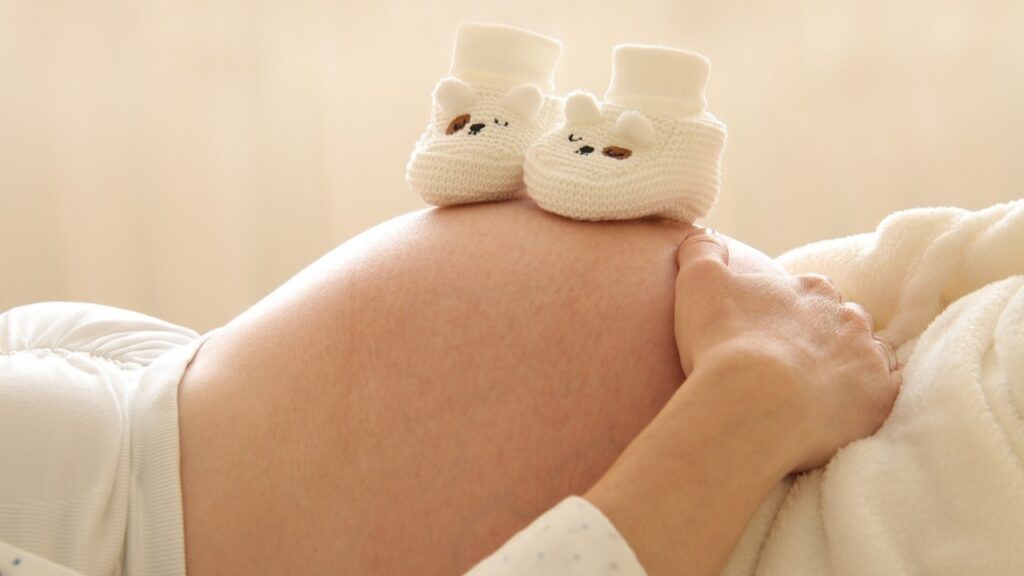healthy pregnancy signs: Pregnancy is an exciting and transformative journey, but it’s also natural to have concerns about whether everything is progressing as it should. Knowing the signs of a healthy pregnancy can provide reassurance and help you focus on what truly matters—nurturing yourself and your baby. From tracking your baby’s movements to maintaining a balanced lifestyle, understanding these indicators can empower you to navigate pregnancy with confidence.
This guide explores the most common signs of a healthy pregnancy and offers practical tips to support your pregnancy health naturally.
Signs of a Healthy Pregnancy
Your body gives clear signals when your pregnancy is progressing well. Here are the top signs that your baby and your body are thriving:

1. Steady Weight Gain
Gaining weight gradually and within the recommended range is a positive sign. It reflects your baby’s growth, increased blood volume, and the development of essential structures like the placenta and amniotic fluid.
- Women with a normal pre-pregnancy BMI typically gain 25-35 pounds.
- During the second and third trimesters, gaining about 1 pound per week is considered normal.
Example: If your doctor praises your steady weight gain, it’s a great indicator that your baby is receiving the nutrients they need.
2. Regular Baby Movements
Feeling your baby move is a joyful milestone and a key sign of a healthy pregnancy. Movements often begin around weeks 18-22, starting as flutters and becoming more pronounced as your baby grows.
- Expect regular movement patterns by the third trimester.
- Fewer movements may require attention, so speak to your doctor if you notice significant changes.
Tip: Keep a movement journal to track patterns and ensure consistency.
3. Healthy Blood Pressure Levels
Blood pressure plays a vital role in pregnancy health. While fluctuations are common, excessively high or low levels could indicate issues.
- Normal pregnancy blood pressure: around 120/80 mmHg.
- High blood pressure may signal preeclampsia, while low levels can cause dizziness.
Prenatal care tips: Stay hydrated, reduce salt intake, and attend regular checkups to monitor blood pressure.
4. Strong and Steady Baby Heartbeat
Your healthcare provider will monitor your baby’s heartbeat during prenatal visits. A consistent heartbeat ranging from 110-160 beats per minute is a reassuring sign.
- Early in pregnancy, the heartbeat is checked via ultrasound.
- From the second trimester onward, a Doppler device is commonly used.
5. Reduction in Morning Sickness After the First Trimester
Morning sickness is a normal part of early pregnancy, but it typically subsides after the first trimester. Persistent nausea may require additional support from your doctor.
Signs of a healthy pregnancy related to nausea:
- Symptoms decrease by weeks 12-14.
- You can keep food and fluids down without issue.
6. Positive Results from Prenatal Tests
Routine tests like ultrasounds and bloodwork help track your baby’s development and detect potential issues early. Clear and positive results are strong indicators of a healthy pregnancy.
Tests often include:
- Genetic screenings during the first and second trimesters.
- Blood glucose tests to check for gestational diabetes.
- Regular ultrasounds to monitor growth and development.
7. Overall Emotional and Physical Well-Being
Your emotional health is closely tied to your pregnancy health. Feeling positive, supported, and energized is a great sign that you’re taking care of yourself.
Self-care tips for emotional wellness:
- Practice mindfulness or prenatal yoga.
- Stay connected with loved ones and communicate openly about your feelings.
- Seek professional support if you experience prolonged anxiety or depression.
How to Support a Healthy Pregnancy Naturally

Maintaining pregnancy wellness naturally involves nurturing your body and mind. Here are some effective ways to support a thriving pregnancy:
Nutrition for Pregnancy Health
Eating a balanced diet is one of the most critical aspects of prenatal care. Include these nutrient-rich foods:
- Folic Acid: Leafy greens, fortified cereals, and lentils.
- Iron: Lean meats, beans, and spinach.
- Calcium: Dairy products, tofu, and almonds.
- Omega-3 Fatty Acids: Salmon, walnuts, and chia seeds.
Tips for Healthy Eating:
- Eat smaller, frequent meals to manage nausea and maintain energy.
- Stay hydrated with water, herbal teas, or clear broths.
- Limit caffeine to less than 200 mg per day (about one 12-ounce coffee).
Physical Activity and Movement
Exercise during pregnancy benefits both you and your baby by improving circulation, reducing stress, and promoting better sleep.
Safe activities include:
- Walking
- Prenatal yoga
- Swimming
Precautions: Avoid high-impact sports and consult your doctor before starting any new exercise routines.
Sleep and Rest
Adequate rest helps your body adapt to the physical and hormonal changes of pregnancy. Aim for 7-9 hours of sleep each night.
Tips for better sleep:
- Use a pregnancy pillow for added comfort.
- Maintain a consistent bedtime routine.
- Avoid heavy meals or caffeine close to bedtime.
Stay on Top of Prenatal Care
Regular prenatal visits are essential for monitoring signs of a healthy pregnancy. During these appointments, your doctor will:
- Check your baby’s growth and heartbeat.
- Address any concerns or symptoms.
- Provide guidance on managing pregnancy health.
Recognizing Pregnancy Health Myths

It’s easy to get overwhelmed by the sheer volume of advice during pregnancy. Let’s debunk some common myths:
- Myth: If you don’t gain a lot of weight, your pregnancy isn’t healthy.
Fact: Weight gain depends on various factors, and steady, doctor-approved progress is key. - Myth: You can’t exercise during pregnancy.
Fact: Light exercises like walking and yoga are safe and beneficial. - Myth: Morning sickness harms your baby.
Fact: Typical morning sickness does not affect your baby’s development.
Conclusion
A healthy pregnancy is marked by steady growth, positive emotional well-being, and regular movement from your baby. Simple practices like eating a nutritious diet, staying active, and attending prenatal visits can significantly impact your pregnancy health. Understanding these signs allows you to enjoy this incredible journey with peace of mind, knowing you’re doing everything to nurture yourself and your baby.
FAQs About Healthy Pregnancy Signs
How can I track my baby’s movements?
Lie down in a quiet place and count movements for an hour. Feeling 10 or more movements during this time is a positive sign.
What are the best foods to eat during pregnancy?
Include folic acid, iron, and calcium-rich foods like leafy greens, lean proteins, dairy, and nuts. These promote your baby’s growth and your overall health.
How often should I visit my doctor during pregnancy?
Generally, visits occur every 4 weeks until 28 weeks, then every 2 weeks until 36 weeks, and weekly afterward. Regular checkups are vital for monitoring signs of a healthy pregnancy.
Is mild cramping normal during pregnancy?
Yes, light cramping can occur as your uterus stretches. However, severe or persistent pain should be discussed with your healthcare provider.
Can I take supplements for pregnancy wellness naturally?
Always consult your doctor before taking any supplements. Some may not be safe for pregnancy despite being labeled “natural.”





Pingback: 9 Importance of Self-Care During Pregnancy Explained
Pingback: 5 Key Reasons Maternal Health During Pregnancy Is Crucial for You and Your Baby